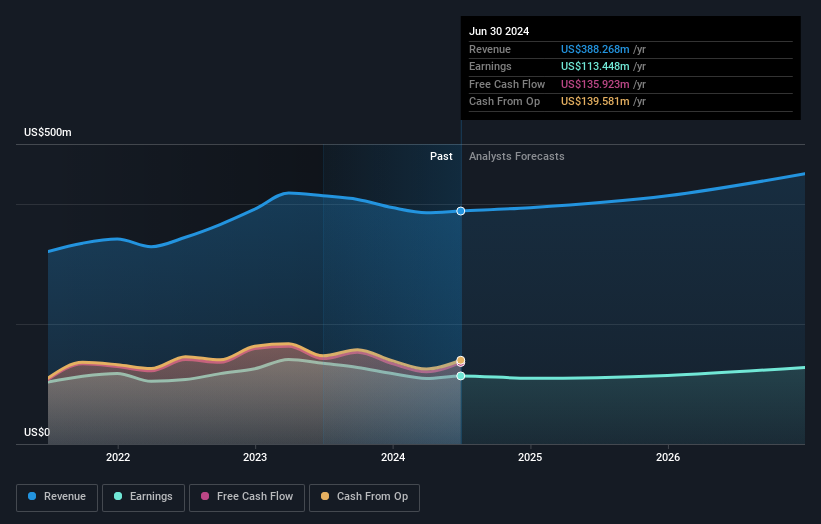- United States
- /
- Banks
- /
- NasdaqGS:TCBK
TriCo Bancshares' (NASDAQ:TCBK) large institutional owners must be happy as stock continues to impress, up 5.6% over the past week

Key Insights
- Institutions' substantial holdings in TriCo Bancshares implies that they have significant influence over the company's share price
- The top 16 shareholders own 51% of the company
- Insiders have sold recently
A look at the shareholders of TriCo Bancshares (NASDAQ:TCBK) can tell us which group is most powerful. And the group that holds the biggest piece of the pie are institutions with 64% ownership. That is, the group stands to benefit the most if the stock rises (or lose the most if there is a downturn).
And things are looking up for institutional investors after the company gained US$77m in market cap last week. The one-year return on investment is currently 42% and last week's gain would have been more than welcomed.
Let's take a closer look to see what the different types of shareholders can tell us about TriCo Bancshares.
View our latest analysis for TriCo Bancshares

What Does The Institutional Ownership Tell Us About TriCo Bancshares?
Institutional investors commonly compare their own returns to the returns of a commonly followed index. So they generally do consider buying larger companies that are included in the relevant benchmark index.
TriCo Bancshares already has institutions on the share registry. Indeed, they own a respectable stake in the company. This suggests some credibility amongst professional investors. But we can't rely on that fact alone since institutions make bad investments sometimes, just like everyone does. When multiple institutions own a stock, there's always a risk that they are in a 'crowded trade'. When such a trade goes wrong, multiple parties may compete to sell stock fast. This risk is higher in a company without a history of growth. You can see TriCo Bancshares' historic earnings and revenue below, but keep in mind there's always more to the story.

Investors should note that institutions actually own more than half the company, so they can collectively wield significant power. TriCo Bancshares is not owned by hedge funds. FMR LLC is currently the company's largest shareholder with 9.0% of shares outstanding. With 7.4% and 5.5% of the shares outstanding respectively, BlackRock, Inc. and The Vanguard Group, Inc. are the second and third largest shareholders. Furthermore, CEO Richard Smith is the owner of 0.9% of the company's shares.
After doing some more digging, we found that the top 16 have the combined ownership of 51% in the company, suggesting that no single shareholder has significant control over the company.
While it makes sense to study institutional ownership data for a company, it also makes sense to study analyst sentiments to know which way the wind is blowing. There are plenty of analysts covering the stock, so it might be worth seeing what they are forecasting, too.
Insider Ownership Of TriCo Bancshares
While the precise definition of an insider can be subjective, almost everyone considers board members to be insiders. The company management answer to the board and the latter should represent the interests of shareholders. Notably, sometimes top-level managers are on the board themselves.
Most consider insider ownership a positive because it can indicate the board is well aligned with other shareholders. However, on some occasions too much power is concentrated within this group.
We can see that insiders own shares in TriCo Bancshares. It is a pretty big company, so it is generally a positive to see some potentially meaningful alignment. In this case, they own around US$59m worth of shares (at current prices). If you would like to explore the question of insider alignment, you can click here to see if insiders have been buying or selling.
General Public Ownership
With a 31% ownership, the general public, mostly comprising of individual investors, have some degree of sway over TriCo Bancshares. This size of ownership, while considerable, may not be enough to change company policy if the decision is not in sync with other large shareholders.
Next Steps:
It's always worth thinking about the different groups who own shares in a company. But to understand TriCo Bancshares better, we need to consider many other factors. For instance, we've identified 1 warning sign for TriCo Bancshares that you should be aware of.
But ultimately it is the future, not the past, that will determine how well the owners of this business will do. Therefore we think it advisable to take a look at this free report showing whether analysts are predicting a brighter future.
NB: Figures in this article are calculated using data from the last twelve months, which refer to the 12-month period ending on the last date of the month the financial statement is dated. This may not be consistent with full year annual report figures.
Valuation is complex, but we're here to simplify it.
Discover if TriCo Bancshares might be undervalued or overvalued with our detailed analysis, featuring fair value estimates, potential risks, dividends, insider trades, and its financial condition.
Access Free AnalysisHave feedback on this article? Concerned about the content? Get in touch with us directly. Alternatively, email editorial-team (at) simplywallst.com.
This article by Simply Wall St is general in nature. We provide commentary based on historical data and analyst forecasts only using an unbiased methodology and our articles are not intended to be financial advice. It does not constitute a recommendation to buy or sell any stock, and does not take account of your objectives, or your financial situation. We aim to bring you long-term focused analysis driven by fundamental data. Note that our analysis may not factor in the latest price-sensitive company announcements or qualitative material. Simply Wall St has no position in any stocks mentioned.
About NasdaqGS:TCBK
TriCo Bancshares
Operates as a bank holding company for Tri Counties Bank that provides commercial banking services to individual and corporate customers.
Flawless balance sheet average dividend payer.
Similar Companies
Market Insights
Community Narratives



